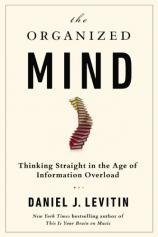The Organized Mind: Thinking Straight in the Age of Information Overload
Review
The Organized Mind: Thinking Straight in the Age of Information Overload
In this informative book, we learn that we have information overload. In fact, it is this overload that causes us to have trouble making decisions, this very glut of facts that keeps us from being able to organize our minds.
The author, McGill professor Daniel J. Levitin (THIS IS YOUR BRAIN ON MUSIC), has kindly done some organization for us to illustrate how confounding it can be. An example cited in an early chapter is the Wittgenstein conclusion that “there is no list of attributes that could unambiguously define” the category “game.” Is a game something you do for exercise? That lets out Monopoly. Is it something you do with friends? Then what about Solitaire? The very language we use to define categories can prevent our ability to organize them. Then there is the social aspect. We are suspicious of those who are different, but what denotes difference? Organization requires action, but humans tend to procrastinate --- either not starting a project or refusing to finish it. Undoubtedly, the great leap forward from books to touchscreens has made our minds scatter like so many angry birds, so we all need to learn, and relearn, how to focus and process.
"In this informative book, we learn that we have information overload. In fact, it is this overload that causes us to have trouble making decisions, this very glut of facts that keeps us from being able to organize our minds."
One fascinating analysis here is Levitin’s look at the nitty-gritty of information organization: life and health threats, and the need to make crucial decisions in a hurry. Faced with medical fears and trying to separate fact from fable, we may turn to “alternative” medicine. Since when we are sick, we are “bombarded with information…at a time when we are least emotionally prepared to deal with it,” and since alternatives are just remedies “for which there is no evidence of effectiveness,” and since people die all the time after being treated with standard medical techniques, we may make a place in our brain for the notion that healthy eating, exercise or certain herbs are more effective than what a doctor prescribes.
And indeed, Levitin avers, we may be right, giving an example of a friend who has survived by following alternative practices, 12 years after being told he had six months to live. He points out that most people being told they have a serious, life-threatening diagnosis are not prepared to sort through the percentage factors that a doctor may throw at them ("a 35% chance of this, a 5% chance of that"), so he offers tools for examining such probabilities rationally.
There are some wonderful truisms that still apply to the problem of organization. One is that if you need something done, you should assign it to the busiest person you know. Another is that by looking in our junk drawer, intellectual or actual, we can learn a lot about ourselves. As Levitin wisely posits, “it’s the human condition to fall prey to old habits,” but freedom lies in cleaning out the closets, literally and mentally. It’s not only a way to learn more efficiently when you’re young and keep your mind younger longer, it also could save your life.
Reviewed by Barbara Bamberger Scott on September 12, 2014
The Organized Mind: Thinking Straight in the Age of Information Overload
- Publication Date: August 19, 2014
- Genres: Nonfiction, Psychology
- Hardcover: 512 pages
- Publisher: Dutton Adult
- ISBN-10: 052595418X
- ISBN-13: 9780525954187





